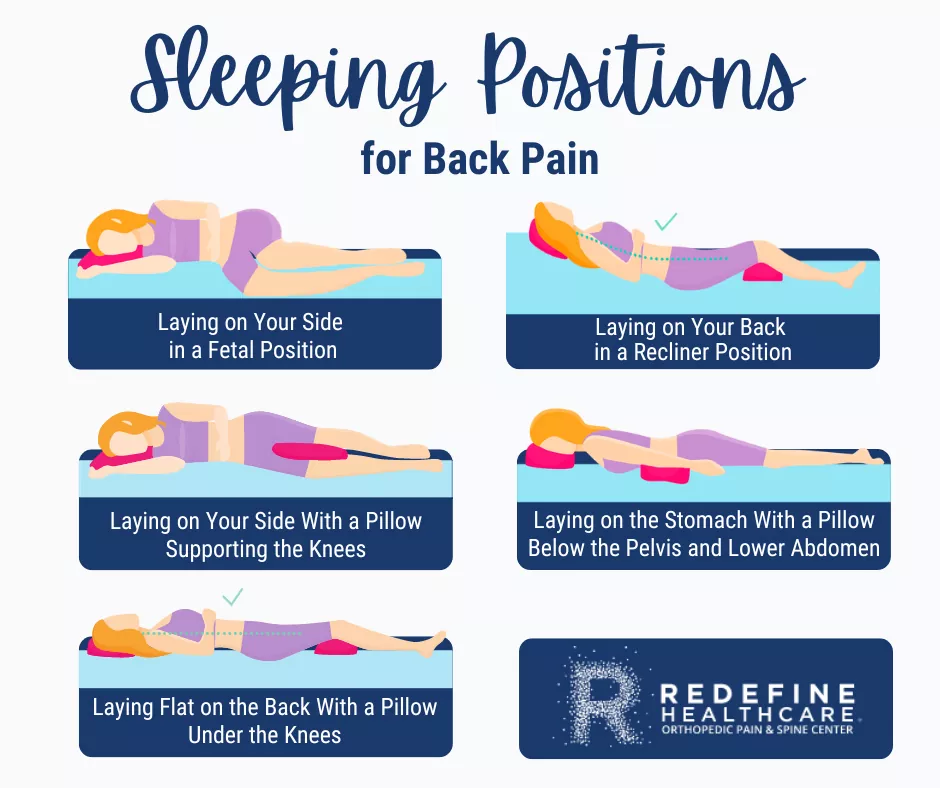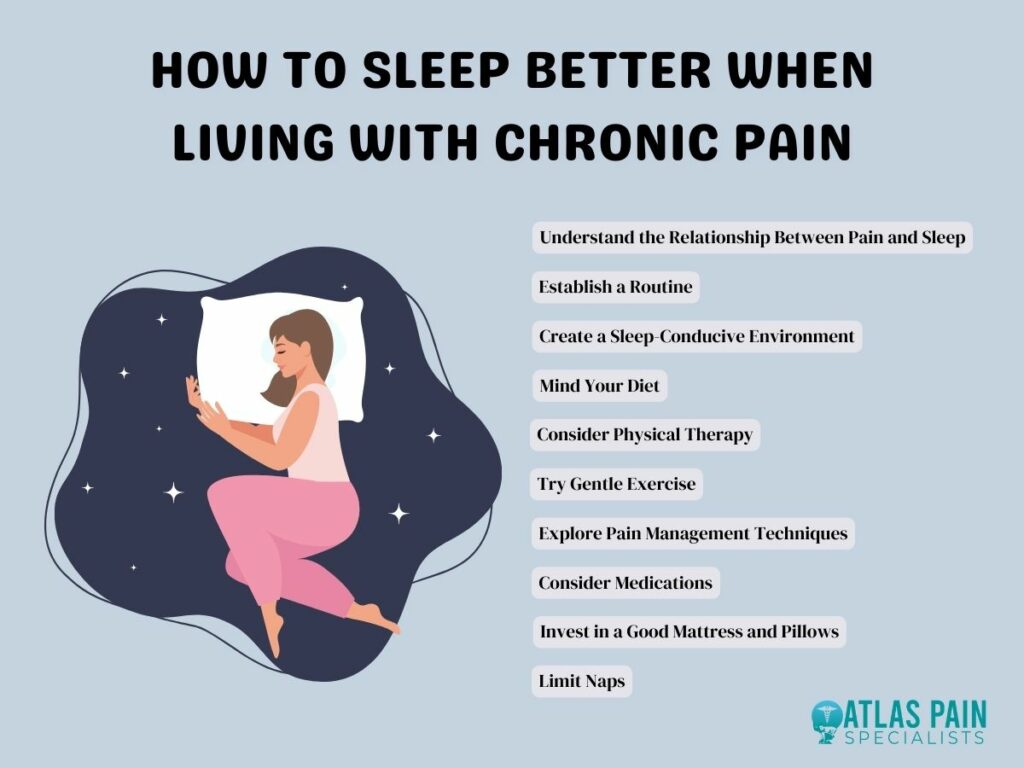Imagine settling into your bed after a long day, ready to drift into a peaceful slumber, only to be kept awake by the nagging discomfort of pain. It’s a situation many know all too well.
Pain and sleep are closely linked, and when one is out of balance, it can wreak havoc on your life. You’re not alone in this struggle, and understanding the connection between pain and sleep could be the key to reclaiming your nights.
We’ll delve into why pain disrupts your sleep and how you can take steps to break the cycle. Discover strategies that can help you find relief and restore the restful nights you deserve. Keep reading to unlock the secrets that could transform your nights from restless to restful.
The Connection Between Pain And Sleep
Pain and sleep share a complex relationship. Poor sleep can worsen pain, while pain can disrupt sleep. Understanding this connection helps manage both conditions better. The cycle can be challenging, affecting daily life. Let’s explore how pain and sleep influence each other.
The Impact Of Pain On Sleep
Pain can make falling asleep difficult. Discomfort keeps the mind alert. This prevents relaxation. Chronic pain sufferers often experience sleepless nights. They wake up frequently due to discomfort. Quality of sleep decreases, impacting overall health.
How Sleep Affects Pain Levels
Lack of sleep increases pain sensitivity. The body struggles to cope with discomfort. Restless nights lead to heightened pain perception. Sleep restores the body’s natural pain-relief systems. Good sleep can reduce pain severity.
The Role Of Stress In Pain And Sleep
Stress often links pain and sleep problems. Stress increases muscle tension, causing pain. It also disrupts sleep patterns. This creates a vicious cycle. Managing stress helps improve sleep and reduce pain.
Strategies For Better Sleep And Pain Management
Establish a regular sleep schedule. Consistency improves sleep quality. Relaxation techniques can ease pain and promote sleep. Meditation and deep breathing calm the mind. Consult healthcare providers for personalized strategies.
Impact Of Pain On Sleep Quality
Experiencing pain can drastically affect how well you sleep. When you’re tossing and turning due to discomfort, restful sleep becomes elusive. This not only impacts your physical health but also your emotional and mental well-being.
Impact On Sleep Cycle
Pain can disrupt your sleep cycle, leading to fragmented sleep. Instead of smoothly transitioning through the stages of sleep, you might wake up frequently. This interruption prevents your body from reaching the deep sleep stages that are crucial for recovery.
Difficulty Falling Asleep
If pain makes it hard for you to find a comfortable position, falling asleep feels like an uphill battle. You might lie awake for hours, feeling frustrated as the minutes tick by. This struggle can make bedtime something you dread rather than anticipate.
Reduced Sleep Duration
Pain can shorten the amount of time you spend asleep. Even if you manage to doze off, the discomfort might wake you up earlier than planned. You might find yourself staring at the ceiling, wishing you could just catch a few more hours.
Emotional Toll
Lack of sleep due to pain can take an emotional toll on you. You might notice increased irritability or a sense of hopelessness. How does pain affect your mood and relationships? Consider whether sleepless nights have made you less patient or more withdrawn.
Practical Solutions
What can you do to improve sleep despite pain? Start by evaluating your sleep environment. Is your mattress supportive? Are your pillows comfortable? Adjusting these elements can make a significant difference.
Consider relaxation techniques like deep breathing or meditation before bed. These can help calm your mind and might even reduce your perception of pain. Experiment with different methods to find what works best for you.
If pain persists, consulting with a healthcare professional might provide more tailored solutions. They can suggest treatments or adjustments that might improve your sleep quality significantly.
Pain doesn’t have to control your sleep. Take charge, make changes, and aim for restful nights. After all, isn’t a good night’s sleep worth the effort?
Chronic Pain And Insomnia
Chronic pain and insomnia often go hand in hand. Pain can make falling asleep difficult. It can also disrupt sleep throughout the night. This creates a vicious cycle. Lack of sleep may worsen the perception of pain. The body needs rest to heal and function properly. Without quality sleep, pain may increase over time. Understanding this connection is crucial.
What Is Chronic Pain?
Chronic pain lasts longer than three months. It can stem from injury, illness, or unknown causes. It varies in intensity and affects daily activities. Many people with chronic pain struggle with sleep. Discomfort makes finding a comfortable position hard.
How Insomnia Affects The Body
Insomnia is the inability to fall or stay asleep. It leads to daytime fatigue and concentration problems. The body and mind need sleep to recharge. Without it, stress levels rise and immune function drops. Insomnia can worsen existing health issues.
Chronic pain and insomnia create a feedback loop. Pain interrupts sleep, and poor sleep enhances pain. The brain becomes more sensitive to pain signals. This cycle can lead to increased anxiety and depression. Breaking this cycle is essential for relief.
Strategies To Improve Sleep With Chronic Pain
Develop a relaxing bedtime routine. Avoid screens before bed and keep the room dark. Consider using a comfortable mattress and pillows. Practice deep breathing or meditation to ease tension. Consult a healthcare provider for tailored advice.

Credit: sleepcenterinfo.com
Sleep Disorders Linked To Pain
Sleep disorders are more than just a nighttime nuisance; they can be closely linked to chronic pain. Imagine tossing and turning all night, only to wake up feeling more exhausted than before. It’s a frustrating cycle where pain and poor sleep feed into each other, creating a loop that’s tough to break. Understanding how certain sleep disorders are connected to pain might just be the key to improving your sleep quality and, in turn, your overall wellbeing.
Sleep Apnea And Chronic Pain
Sleep apnea is a common sleep disorder that disrupts breathing during sleep. This interruption can lead to fragmented sleep and decreased oxygen levels. If you suffer from chronic pain, sleep apnea might worsen your symptoms. As someone who has experienced sleep apnea, waking up frequently throughout the night was exhausting. Addressing sleep apnea can not only improve your sleep but also reduce the intensity of your pain.
Insomnia And Muscle Pain
Insomnia is another culprit that can be linked to pain, especially muscle pain. Difficulty in falling or staying asleep can make you feel tense and sore. Imagine waking up with stiff muscles that just won’t loosen up. Simple strategies like establishing a bedtime routine or limiting screen time can help ease insomnia. By tackling insomnia, you might notice a reduction in muscle pain, leaving you feeling more refreshed.
Fibromyalgia And Sleep Disturbances
Fibromyalgia is a condition characterized by widespread pain and tenderness. Many fibromyalgia sufferers experience sleep disturbances, adding to their pain woes. If fibromyalgia is affecting your sleep, exploring therapies like cognitive behavioral therapy for insomnia (CBT-I) might be beneficial. This approach can help you establish better sleep habits, potentially reducing fibromyalgia symptoms.
Restless Legs Syndrome And Joint Pain
Restless Legs Syndrome (RLS) is another sleep disorder that can intensify pain, particularly in the joints. The constant urge to move your legs can lead to discomfort and disrupted sleep. If you find your legs constantly needing to move, consider lifestyle changes such as regular exercise or iron supplements to ease RLS symptoms. Addressing RLS can lead to better sleep and less joint pain.
How often have you considered that your sleep issues could be the root of your chronic pain? By identifying and addressing the sleep disorder linked to your pain, you can start a journey towards better sleep and a more comfortable life. What steps will you take today to improve your sleep and reduce your pain?
Pain Management Techniques For Better Sleep
Struggling with pain can make sleep difficult. Restless nights lead to tired days. Managing pain helps improve sleep quality. Several techniques can aid in this. From medication to lifestyle changes, each offers different benefits. Let’s explore these methods for a restful night.
Medication
Medication can help manage pain effectively. Over-the-counter drugs reduce mild discomfort. For severe pain, doctors prescribe stronger medications. Always follow a doctor’s advice. Never mix medications without consulting them. Side effects can affect sleep patterns.
Therapeutic Approaches
Therapies offer natural pain relief. Physical therapy strengthens muscles and reduces pain. Massage therapy relaxes tense muscles. Acupuncture targets specific pain points. Each method supports better sleep. Speak with a therapist to find the right approach.
Lifestyle Changes
Small changes can improve sleep. Regular exercise reduces stress and pain. A balanced diet supports overall health. Limit caffeine and sugar before bed. Create a calming bedtime routine. Consistent sleep schedules help regulate the body’s clock.
Role Of Sleep In Pain Relief
Sleep plays a vital role in pain relief. It helps the body heal and recover. Quality sleep reduces the perception of pain. Poor sleep can make pain feel worse. Understanding how sleep affects pain is essential. This knowledge helps manage pain better.
Understanding The Sleep-pain Cycle
Pain can disrupt sleep. Lack of sleep increases pain sensitivity. This creates a cycle. Breaking this cycle is key. Sleeping well can reduce pain. It calms the nervous system. Proper rest helps the body repair tissues.
Hormones And Healing
Sleep affects hormone levels. Hormones like cortisol are important. They help control inflammation. Balanced hormones aid in pain relief. Sleep ensures hormones stay in check. This balance supports healing.
Sleep Stages And Pain Relief
The body goes through sleep stages. Deep sleep is crucial. It restores energy and repairs cells. This stage is vital for pain relief. Without it, healing slows down. Ensuring deep sleep is necessary.
Improving Sleep For Better Pain Management
Better sleep can help manage pain. Create a restful environment. Limit screen time before bed. Relaxation techniques can aid sleep. Consistent routines improve sleep quality. Small changes can have big effects.
Mindfulness And Relaxation For Nighttime Comfort
Struggling with pain can disrupt your sleep. This creates a cycle of discomfort. Mindfulness and relaxation techniques can help break this cycle. Practicing these can ease your body and mind. They create a peaceful state conducive to rest. Many find relief through these calming practices. Let’s explore some techniques you might find beneficial.
What Is Mindfulness?
Mindfulness is about living in the present moment. It involves observing thoughts without judgment. This practice fosters a sense of calm. It helps reduce stress and anxiety. For those with pain, mindfulness can offer relief. It encourages focusing on the now. This can lessen the intensity of discomfort. Many people find it helpful before bed.
The Power Of Breathing Exercises
Controlled breathing can be very soothing. It helps slow the heart rate. This leads to a relaxed state. Deep breathing is simple to practice. Inhale slowly through the nose. Hold the breath briefly. Then exhale gently through the mouth. Repeat this process several times. Feel tension melt away with each breath.
Progressive Muscle Relaxation
Progressive muscle relaxation is a technique to reduce stress. It involves tensing and releasing muscles. Begin with your toes and work upwards. Focus on one muscle group at a time. Tighten the muscles, then slowly release. Notice the difference between tension and relaxation. This practice can ease pain and improve sleep quality.
Guided Imagery And Visualization
Guided imagery uses your imagination to relax. Picture a serene place. It could be a beach or a quiet forest. Engage all your senses in the visualization. Imagine the sights, sounds, and smells. This mental escape can reduce stress. It may also lessen pain perception. Visualization is a helpful tool for restful nights.

Credit: redefinehealthcare.com
Future Directions In Pain And Sleep Research
Exploring the link between pain and sleep offers new research directions. Scientists aim to understand how pain affects sleep quality. This understanding could lead to better treatments for those suffering from both issues. Future studies might reveal how improving sleep can reduce pain levels.
Understanding the intricate relationship between pain and sleep is crucial for improving quality of life. As research continues to evolve, the future of pain and sleep studies holds promise for groundbreaking discoveries and practical solutions. Let’s explore some exciting directions researchers are taking in this field.
Personalized Medicine
Imagine a treatment plan tailored just for you, considering your unique genetic makeup and personal history. This is the vision of personalized medicine in pain and sleep research. By analyzing genetic data and lifestyle factors, scientists aim to develop treatments that are more effective and have fewer side effects.
Technology And Sleep Monitoring
With advancements in technology, sleep monitoring is becoming more sophisticated. Smartwatches and sleep apps now offer detailed insights into your sleep patterns. As technology advances, these tools could help you identify how specific factors, like pain, affect your sleep, enabling you to make informed lifestyle adjustments.
Non-pharmacological Interventions
Pharmaceuticals aren’t the only answer to managing pain and improving sleep. Researchers are exploring alternative therapies, such as mindfulness, cognitive-behavioral therapy, and acupuncture. These methods can offer effective relief without the risk of medication dependency.
Understanding The Sleep-pain Cycle
The relationship between sleep and pain is often a vicious cycle: poor sleep can exacerbate pain, and pain can disrupt sleep. Scientists are diving deeper into this cycle to understand its nuances. This research could lead to interventions that break the cycle, improving both pain management and sleep quality.
Environmental And Lifestyle Factors
Your environment and daily habits play a significant role in your sleep quality and pain levels. Future research will likely focus on how factors like diet, exercise, and stress contribute to this equation. Understanding these elements can empower you to make small, impactful changes in your daily routine. What if improving your sleep could reduce your pain, or vice versa? As these research areas develop, you may find new strategies to enhance your well-being. Stay curious and open to new insights that could transform your approach to managing pain and sleep.

Credit: atlaspainspecialists.com
Frequently Asked Questions
How Does Pain Affect Sleep Quality?
Pain can significantly disrupt sleep quality by making it difficult to fall asleep or stay asleep. Chronic pain conditions often lead to increased stress and anxiety, further complicating restful sleep. This cycle can exacerbate pain, creating a challenging loop. Managing pain effectively is crucial for improving sleep quality.
Can Lack Of Sleep Increase Pain Levels?
Yes, insufficient sleep can heighten pain sensitivity and worsen existing pain conditions. Lack of restorative sleep disrupts the body’s natural healing processes, leading to increased inflammation and stress. Prioritizing good sleep hygiene can help break the cycle of pain and poor sleep, enhancing overall well-being.
What Are Common Causes Of Pain-related Sleep Issues?
Common causes include chronic conditions like arthritis, fibromyalgia, and migraines. These conditions can cause discomfort and stress, making sleep elusive. Additionally, stress and anxiety related to pain can worsen sleep quality. Addressing these underlying issues is essential for improving both pain management and sleep.
How Can I Manage Pain For Better Sleep?
To manage pain for better sleep, consider using relaxation techniques, such as deep breathing or meditation. Over-the-counter pain relievers or prescribed medications can also help. Establishing a consistent sleep routine and creating a comfortable sleep environment are essential steps. Consult a healthcare professional for personalized advice.
Conclusion
Sleep and pain are closely linked. Each affects the other. Poor sleep can worsen pain. Pain can disrupt sleep, leading to exhaustion. Finding balance is key. Simple steps can help. Try relaxation techniques. Consider a comfortable mattress. Create a calming bedtime routine.
Focus on small changes. These can improve sleep and reduce pain. Your body needs rest to heal. Prioritize sleep for better health. Consult a professional if needed. They can offer guidance tailored to your needs. Better sleep leads to a healthier, more energetic life.
Start making changes today for a brighter tomorrow.
